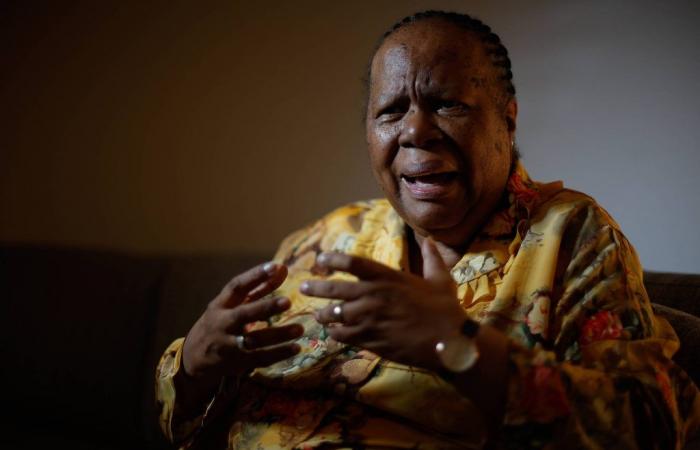
South African Foreign Minister Naledi Pandor, 70, says in an interview with Sheet that the recent Israeli attacks on Gaza have created a situation much worse than apartheid — the South African racial segregation regime that existed between 1948 and 1994.
“The recent acts of hostility, killing and destruction of property are, in our view, far worse than what we have experienced [no apartheid]”, stated Pandor, who made a two-day visit to Brasília this week.
South Africa is one of Israel’s most vocal critics, having filed a complaint at the International Court of Justice in The Hague that accuses Tel Aviv of committing genocide in Gaza. The Lula (PT) government supported the South African initiative.
Among the initial measures adopted at the end of January, the court understood that it has the power to judge Israel, but frustrated Palestinians by not issuing an immediate ceasefire order. The body is unlikely to rule on the merits of the genocide accusations anytime soon, as a trial on the matter could drag on for years. The Israeli government of Binyamin Netanyahu calls the accusation of genocide in The Hague “outrageous”.
Asked about the comparison made by Lula between Israeli action and the Holocaust, Pandor replied that she would never criticize the PT member.
The South African chancellor fulfilled an agenda in Brasília that reflects the political proximity between the two governments: on Monday (22) she gave a class to student diplomats at the Rio Branco Institute, participated in a dinner at the Palestinian embassy; the following day, she held meetings at Itamaraty and was received by Lula at Planalto.
One of the accusations made against the Israeli government is that the country practices apartheid towards the Palestinians. What similarities does Mrs. point?
It is clear that there are many similarities with the way black people were treated in South Africa during apartheid. This is why today many people talk about apartheid in Israel. The practice of separating and confining a group of people to a specific territory; the requirement for permits, not being able to move between one area and another without submitting to identification controls by security forces… we had all these experiences under apartheid, including the most significant: the expropriation of land without compensation. So there are many practices that imitate what South Africa experienced during apartheid.
There are aspects that are very similar. To some degree, in the face of violence in Gaza, as South Africans, we feel that this goes beyond what we have experienced [no apartheid]. Of course we had murder, torture, but we never had the indiscriminate destruction of a community, the intention to cause famine, the intention to deny water and energy. Recent acts of hostility, killing and destruction of property are, in our view, far worse than what we experienced [no apartheid].
Out there
Receive in your email a weekly selection of the most important things happening in the world
But what about Israel’s right to self-defense?
I don’t understand how you defend yourself against the population under your occupation. People without control by security forces, access to weapons or guarantee of freedom. How do you defend yourself against defenseless people? The country carrying out an occupation has a responsibility to protect those under its occupation. They [as pessoas que vivem no território] they do not become enemies as a result of the occupation. If there are hostile organizations against the people of Israel, of course Israel has the right to defend itself against them. But the civilian Palestinian is not a hostile agent against Israel.
Doesn’t Israel have the right to defend itself against Hamas?
If there is an attack against your population, you need to use your intelligence service to make sure you target those who are truly responsible for the attack. Not a 13-year-old child, a 9-year-old girl or a newborn. They cannot be called Hamas. When you look at the nature of the response, it has gone far beyond the attack committed by Hamas [em outubro de 2023, quando cerca de 1.200 israelenses foram mortos].
There is a bipartisan initiative in the US Congress to pressure the Biden administration to radically review its relationship with South Africa, among other reasons for South Africa’s strong opposition to Israel. The same project accuses his government of having ties to Hamas. Does the position in relation to Gaza put South African national interests at risk, by threatening relations with the world’s main economy?
I hope we are not threatening our relationship [com os EUA] because it is important to us. We have no ties to Hamas. There are many inaccuracies in this project, which alleges all types of relationships just to tarnish the image of South Africa.
One of the lessons that the so-called great powers usually transmit to Africans is that we need to respect democracy and human rights. But when we defend these values, we are suddenly accused of being associated with terrorist organizations. We cannot understand: why is it acceptable for the Palestinian people not to enjoy freedom while others value freedom so highly? I hope that our stance in defense of freedom does not affect our economic opportunities. Because that would mean that we cannot practice human rights, that we should take another route. I don’t think we would want to go in that direction. We are a country that loves freedom, peace and that believes that all human beings are equal — and equally deserving of human rights.
Lula in February compared Israel’s attacks in Gaza to Hitler’s decision to kill the Jews, in a reference to the Holocaust. Do you agree with this statement?
I would never criticize President Lula. I think one of the issues we all need to look at is why we think Israel deserves impunity. This is a level of impunity that no other nation has. Can you imagine what the world would say if we, black South Africans, had decided to roam the country after gaining our freedom shooting at white people, our former oppressors? What would the world be saying? Nobody would accept that. But for Israel we can call things by different, kinder names. Around 30,000 Palestinians were killed. Why doesn’t this cause us agony and worry that in the 21st century something like this could happen?
The Brazilian presidency of the G20 is going through a situation similar to that experienced by South Africa last year in relation to the arrest warrant against the president of Russia, Vladimir Putin, and his possible visit to the country. Does Brazil have something to learn from the South African experience?
We sent an invitation to President Putin and he decided not to attend [ao Brics]. It was entirely his decision. Russia is a member of BRICS and we need to show it the courtesy we give to any member of the bloc. In the end it’s their decision [russos]. Again, we return to the topic I already raised: double standards. There are a series of horrors occurring in the occupied territories of Palestine. When Russia invaded Ukraine, a warrant [de prisão] was issued immediately after the submission of a complaint to the International Criminal Court. We filed complaints with the court against Israel’s leaders and no warrants were issued. People are treated differently depending on who the victim is.
But doesn’t South Africa adopt different weights when denouncing Israel and preserving, for example, Russia from criticism for the war in Ukraine?
We criticize Russia regarding the violation of the UN Charter and the invasion of the territory of a sovereign state. But we also emphasize that South Africa has a non-aligned position in relation to the great powers and the fights between them. The developing world suffered during the Cold War as it was pressured to choose sides. We do not want to become a victim of great power quarrels.
Regarding Russia, we have always argued that the conflict needs to be resolved through negotiations. We continue to encourage a negotiating table between the two leaders. Brazil is part of this, as is India. We are saying that we cannot just discuss the Ukrainian peace plan, we want to have Russia and Ukraine in the same room. We are working hard to make this possible. Through the position we have adopted, we are one of the few countries that speak so much to the president [Volodimir] Zelensky as with President Putin. Few countries, even in the most powerful parts of the world, speak to both. I believe that the path we adopt is very important.
In 2023, the Brics expanded with the invitation to Argentina, Saudi Arabia, Egypt, the United Arab Emirates, Ethiopia and Iran. Almost a year later, Argentina withdrew from joining the bloc and the Saudis have not yet formally responded. Does this mean the expansion failed?
No. Countries that wanted to be part of BRICS came to us. We didn’t go around asking if they wanted to be part of it. Everyone wrote to us, so expansion occurred through voluntary indication of interest. We are not surprised that Argentina withdrew, they [governo Javier Milei] They told us that they had very different priorities from those of the previous government.
The Sherpa [negociador-chefe] of Saudi Arabia has attended the Brics meetings, despite this uncertainty about which we do not know the origin. We have not yet definitively seen exactly what stance Saudi Arabia will adopt.
Does Iran’s entry into Brics constrain countries like South Africa and Brazil to defend respect for human rights, especially women’s rights?
Part of cooperation is engagement and persuasion. Having the opportunity, being close, to talk about difficult topics with the aim of resolving them together. Being in training [como o Brics] It opens up an opportunity for us to talk about topics that would be more difficult to discuss in other environments. But we also need to be very careful. One of the things I resisted as Minister of Foreign Affairs is assuming that the enemy of someone who claims to be my friend must also be my enemy. I do not believe that. We have to be very careful not to let others define our relationship with the world.
Do you see further expansion of Brics in the short term?
There is a high level of interest. But I don’t think we were designed to be an institution. It’s something we need to think about very carefully because if we get too big, all sorts of demands can be made on you to adopt a position that may not be the one you want. I think we need to have an environment that can be managed effectively. We are looking after the interests of the Brics very carefully, because we do not want it to lose its essence.
X-RAY
NALEDI PANDOR, 70
Member of parliament since 1994 for the African National Congress, the party that has governed the country since the end of apartheid. She has been the head of South African diplomacy since 2019. Previously, she was minister of Higher Education, Science and Technology, Home Affairs and Education. She has a Masters in Education from the University of London and in Linguistics from the University of Stellenbosch, as well as a PhD from the University of Pretoria.
Tags: Situation Gaza today worse apartheid South African chancellor World
--




